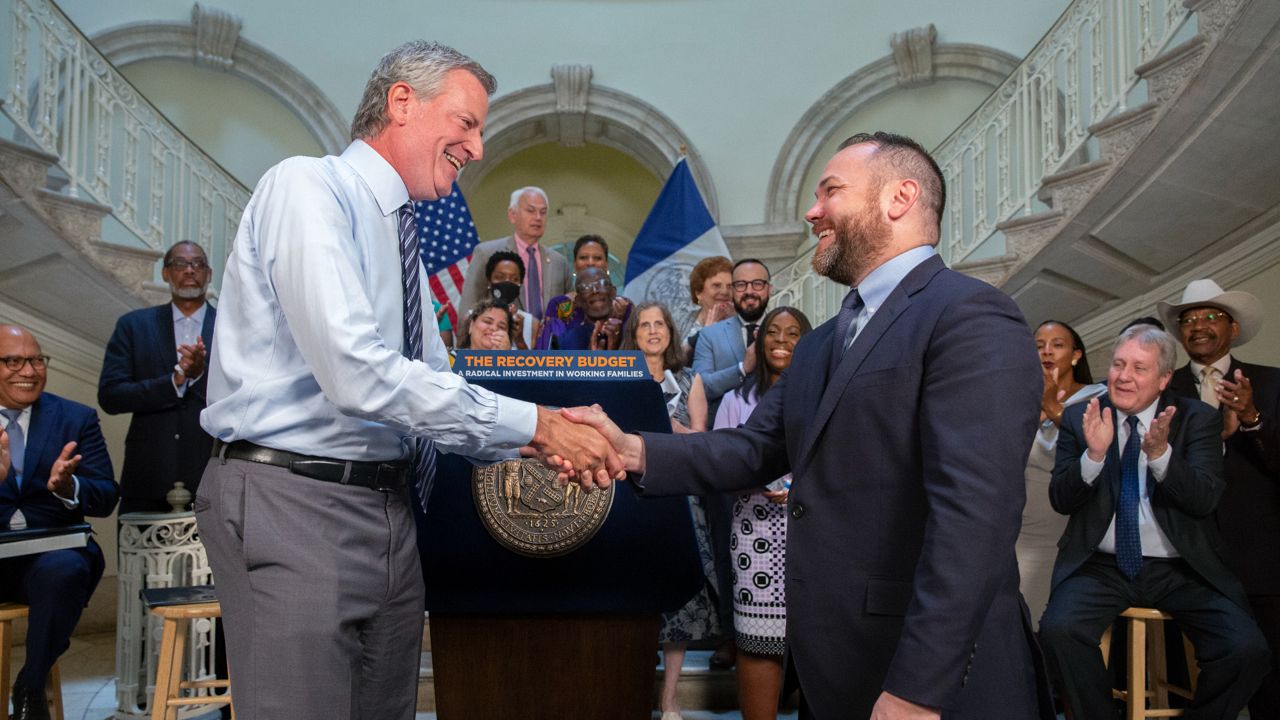Increased spending on students. New funding for LGBTQ equity programs. Restoring pandemic-era cuts to cultural institutions and libraries. And another $500 million invested in the city’s new “rainy day” emergency fund.
Those are some of the initiatives that city leaders touted at a news conference Wednesday morning in announcing a $98.7 billion budget deal for the fiscal year beginning Thursday. Mayor Bill de Blasio and Speaker Corey Johnson each described the budget, which was approved by the City Council Wednesday afternoon, as a victory for working-class New Yorkers.
“This is one of the greatest investments in working families in the history of New York City,” de Blasio said.
It is also the city’s largest-ever budget, buoyed by infusions in stimulus funding, including $14.2 billion from the federal government.
De Blasio defended using stimulus money, which will end after next year, to fund recurring programs, saying that he expects a planned federal infrastructure bill as well as the city’s economic recovery to cover future budget gaps.
“I find it fascinating that you think it's a problem there is a flood of money coming into the city,” de Blasio said in response to a question from NY1. “What I think is gonna happen is revenue is gonna come back stronger and stronger as the economy grows at a very strong rate.”
Relying on federal stimulus dollars to fund recurring programs leaves those programs open to being cut in the future if revenue does not meet expectations, according to Ana Champeny, the director of city studies for the Citizens Budget Commission, a nonpartisan budget watchdog group.
“The questions for us are: Are you effectively managing the city’s finances, are you strategically leveraging all these resources for the recovery, and are you preparing for the next crisis?” she said.
But Champeny said that the $500 million the budget allocates to the emergency “rainy day” fund speaks well to the long-term fiscal planning in the budget.
“We think that is definitely a good first step,” Champeny said.
The budget also adds funding to the city’s district attorneys, as well as to the Department of Correction and the police department.
The $225 million added to the NYPD budget reflected $166 million to cover overtime, $47 million to cover information technology investments and $12 million to fund a March police reform bill.
The bill also includes funding for community-focused violence prevention programs, which de Blasio described as investments in public safety that would fuel an economic recovery.
"Recovery equals public safety, public safety equals recovery," he said.
The budget also includes new funding for education, including money to hire 500 new social workers and insure at least one social worker in every public school; money for 137 new community schools that will operate in existing public school campuses; and funding for an emergency phone line that will have social workers, and not police, respond to child mental health crises.
The council adopted the budget Wednesday afternoon, with six members voting against it and four not present.
Several council members touted elements of the budget, such as a record $2.25 billion budgeted for the city health department and a bail fund for new immigrants.
Two council Republicans who voted against the bill criticized it as overly large, while progressive council members who voted no criticized the budget for increasing funding to the NYPD and for a lack of transparency about how recurring programs will be funded.
"It should trouble us that many of our neighbors continue to lack access to stable housing, good schools, mental health care and good paying jobs, while we're still managing to find money to expand staff and overtime at the New York Police Department," Council Member Antonio Reynoso said in explaining his no vote.
Council Member Brad Lander, a leading candidate for comptroller, also voted no, saying in a statement that the budget process did not afford sufficient transparency to other members or the public, noting that a budget report on hundreds of millions in discretionary funding was released late last night, and not at least 24 hours before the vote, as is customary.
This is the final budget from de Blasio, Johnson and other City Council leaders.



